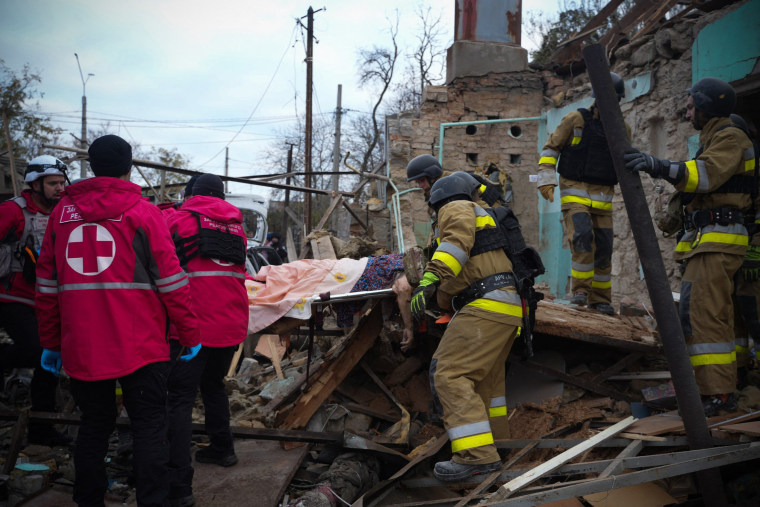A Ukrainian rescuer extinguishes a fire after a drone attack in Mykolaiv.Ukrainian Emergency Service / AFP – Getty Images
“Severe damage to Ukraine’s energy system, including to DTEK power stations. These attacks again highlight Ukraine’s need for additional air defense systems from our allies,” said Maxim Timchenko, CEO of DTEK, Ukraine’s largest private power company.
The extent of the damage was hard to assess. After repeated Russian attacks on the power grid, officials reveal little detailed information about the outcome of strikes and the state of the network.
Officials confirmed damage to “critical infrastructure” or power cuts in regions from Volyn, Rivne, Lviv in the west to Dnipropetrovsk and Zaporizhzhia in the southeast.
DTEK imposed emergency power cuts in the southern Odesa region but had lifted them in three other regions by late morning. Emergency work was ongoing in the Odesa, Rivne and Volyn regions, national grid operator Ukrenergo said.
Russia’s Defense Ministry said it had launched a massive strike on energy facilities that supply Ukraine’s military-industrial complex.
“The enemy’s target was our energy infrastructure across Ukraine,” President Volodymyr Zelenskyy said.

Ukraine nervous about Western diplomacy
Kyiv’s air force said it had destroyed 104 of the incoming 120 missiles and shot down 42 drones. Another 41 disappeared from radar, it said.
At least seven people were killed, in the regions of Lviv, Mykolaiv, Odesa and Dnipropetrovsk, authorities said.
Moldovan Deputy Prime Minister Mihai Popsoi said Russian missiles and drones had violated Moldovan airspace during the attack. NATO member Poland, which also borders Ukraine, said it had scrambled its air force as a precaution.
Russia last launched a major barrage at Kyiv on Aug. 26, when officials said it had fired more than 200 drones and missiles at targets across Ukraine.
Its latest onslaught piles more pressure on Ukraine as Moscow’s troops notch up their fastest battlefield gains in the east since 2022 in their effort to seize the entire industrial Donbas region.
Ukrainian troops are meanwhile trying to hold an area of land that they seized in Russia’s Kursk region in August, something Kyiv has said could one day be a bargaining chip.
Sybiha said the strike appeared to be Moscow’s “true response” to leaders contacting President Vladimir Putin, an apparent swipe at German Chancellor Olaf Scholz, who called the Russian leader on Friday for the first time in two years.
Though Scholz urged Putin to pull out his troops, which occupy a fifth of Ukraine, Kyiv bridled at a call that it said reduced Putin’s isolation.
Polish Prime Minister Donald Tusk echoed Sybiha: “The attack last night, one of the biggest in this war, has proved that telephone diplomacy cannot replace real support from the whole West for Ukraine. The next weeks will be decisive, not only for the war itself, but also for our future.”
